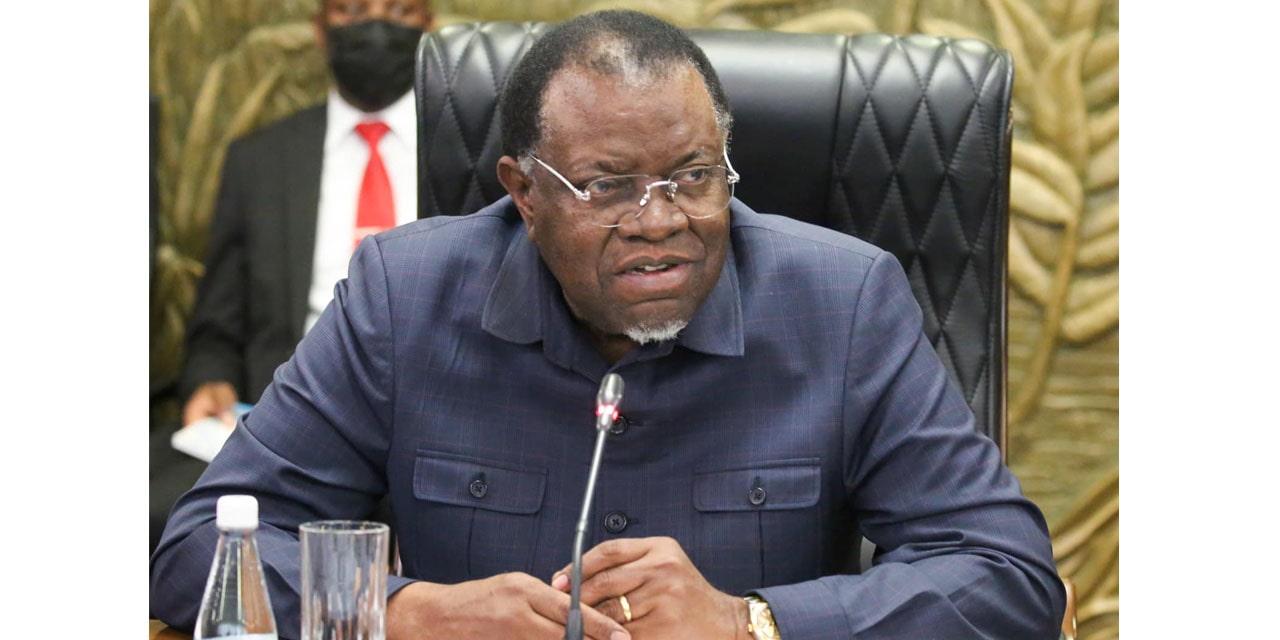Staff Writer
President Hage Geingob has appealed to government officials to fast track the implementation of the usage of Identity Documents (IDs) as a means of travelling between Namibia and Botswana, as opposed to now where only a valid passport is used. If this provision is realised it will make travelling easier for the inhabitants of the two nations who share mutual livelihoods and borders.
This will result in the usage of a border pass to be granted with an ID, that will allow the visitors to travel up to a certain distance in the other country, or depending on terms and conditions to be agreed on. This is the mode used to travel between Zambia and Namibia for instance.
“As much as our two central Governments are strengthening and deepening relations, it is equally important that people-to-people linkages between our local governments, local communities as well as traditional authorities are nurtured and strengthened. I therefore call on bordering regions in Namibia to enter into mutually beneficial twinning agreements with their counterparts in Botswana,” said Geingob.
In the same vein, our two countries not only share a common border, but also a common people and heritage. A symbiotic and inter-dependent relationship exists along our common borders, he added.
He said in Gaborone, Botswana on Friday where the two countries jointly launched the Bi-National Commission, a new body elevated from the Joint Commission Cooperation established in 1990. “The Joint Commission mechanism which has now been elevated to a Bi-National Commission, has served our countries well in nurturing our excellent cooperation, over the years,” he said, adding that the bilateral relationship grew in leaps and bounds over the years.
“Furthermore in the area of cross border trade we continue to make progress. Our government donated a piece of land at the Port of Walvis Bay, to Botswana to construct a Dry Port and make Botswana sea linked. This was done not only as a gesture of goodwill, but to facilitate imports and exports of goods and services. President Masisi informed me when we met in Rwanda, that Botswana intended to increase its volumes of imports and exports through the port of Walvis Bay,” Geingob recalled. He, therefore, aspires to see accelerated and concerted work efforts, on expanding the transport infrastructure to accommodate increased trade volumes, as a result of the agreement. “Our Ministers must prioritize and include in our development plans, the upgrade and expansion of infrastructure to accommodate anticipated increases in trade volumes,” he reiterated.
The head of state was also, happy to note of another Bilateral Agreement of establishing a One-Stop Border Post at the Mamuno-Trans-Kalahari Border Post to be signed. He said, this will contribute to maximizing the operational efficiency of the SADC Transport Development Corridors, thereby contributing to regional development and economic integration efforts.
“I am pleased to note that our cooperation efforts are extending beyond security, political and economic interests. Despite the difficult start to the year arising from the unfortunate incident on Impalila Island, we have successfully restored our boundary demarcation and both countries committed to facilitate free movement of people along our common borders and share the natural resources,” Geingob stated.
He further emphasised the goodwill relations developing between the two countries, where the Head of State referred to the joint bid to host the 36th Edition of the African Cup of Nations (AFCON) Finals in 2027.
“I thank President Masisi and the Government of Botswana for choosing Namibia as its preferred partner in this adventure, which both countries stand to benefit economically, as well further strengthen the people-to-people bonds between the two countries. We both recognize that hosting AFCON necessitates the upgrading of our Sports infrastructure, which would require significant investments. We note that our Ministers and senior officials have started preparing the modalities for the joint bid. We will need to mobilize our respective private sector players to join hands with our Governments in order to ensure a successful bid. Furthermore, we also need to lobby our counterparts in southern and east Africa to rally behind our bid.”




